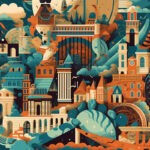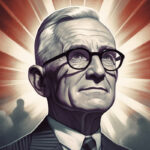Africa has a rich literary history that spans centuries, with writers hailing from all corners of the continent. From iconic novels to groundbreaking plays and powerful poetry, it’s no wonder that African literature is gaining recognition around the world. In this comprehensive guide, we’ll explore some of the best books on Africa, both classic and contemporary, to help you discover the diverse and fascinating world of African literature.

Understanding Africa’s Rich Literary Landscape
African literature is a complex and multifaceted world, shaped by diverse cultures, languages, and histories. But despite its diversity, there are some common threads that run through much of the writing coming out of the continent. One of the most important is the role of storytelling. For generations, African cultures have relied on oral storytelling traditions to pass down knowledge, history, and cultural values. This tradition has continued in the written form and has given rise to some of the most powerful and thought-provoking literature in the world.
One of the most fascinating things about African literature is its ability to capture the essence of the continent’s many different cultures. From the mystical tales of West Africa to the gritty realism of South Africa, African literature reflects the rich diversity of the continent’s people and traditions. This diversity is also reflected in the many different languages in which African literature is written. While English and French are the most commonly used languages, African literature is also produced in Arabic, Swahili, Portuguese, and many other languages.
The Importance of African Literature
So why is African literature worth exploring? For starters, it offers a unique perspective on the world that is often missing from Western literature. African writers tackle issues such as colonialism, racism, and post-colonialism, not just on a personal level but on a larger societal scale. They also address universal themes such as love, loss, and human connection, which resonate with readers from all backgrounds. Additionally, African literature has the power to challenge stereotypes and misconceptions about the continent and its people, bringing a more nuanced and human perspective to the global discourse.
One of the most important aspects of African literature is its ability to give voice to the marginalized and oppressed. Many African writers use their work to shed light on the struggles of those who are often overlooked by society, such as women, LGBTQ+ individuals, and those living in poverty. By doing so, they are able to create a more inclusive and just world, one in which all voices are heard and valued.
The Diversity of African Writing
One of the most striking things about African literature is its diversity. From the haunting post-apocalyptic tale of “The Road to Nowhere” by Nugwa to the socially critical “We Need New Names” by NoViolet Bulawayo, the breadth of African writing is vast. African literature also encompasses a wide range of genres, from poetry and plays to graphic novels and science fiction. With such a diverse array of voices and styles, there’s truly something for everyone in the world of African literature.
One of the most exciting developments in African literature in recent years has been the rise of speculative fiction. African writers have been at the forefront of this genre, using it to explore themes such as identity, culture, and technology in new and innovative ways. Works such as “Binti” by Nnedi Okorafor and “Lagoon” by Nnedi Okorafor push the boundaries of what is possible in science fiction and fantasy, while also drawing on African folklore and mythology to create truly unique and captivating stories.
Overall, African literature is a vibrant and dynamic field that is constantly evolving. With new voices emerging every day, there’s no telling where the next great African writer will come from or what they will have to say. But one thing is certain: African literature will continue to captivate and inspire readers around the world for generations to come.
The Classics: Must-Read African Books
When it comes to African literature, there are certain works that have become classics, defining the genre and inspiring generations of writers. These books offer insight into the history and culture of Africa, as well as universal themes that continue to resonate with readers today.
Things Fall Apart
One of the most iconic African novels of all time is “Things Fall Apart” by Chinua Achebe. This groundbreaking novel explores the impact of colonialism on Nigerian society, touching on themes such as identity, masculinity, and the clash of cultures. The novel follows the life of Okonkwo, a proud and successful Igbo warrior, as he struggles to come to terms with the changes that colonialism brings to his community. Through Okonkwo’s story, Achebe offers a powerful critique of European imperialism and its devastating effects on African societies.
The Famished Road
Another classic African novel that should be on every reading list is “The Famished Road” by Ben Okri. This magical realist novel blends the spiritual and the political to create a truly unique vision of African society. The novel follows the life of Azaro, a spirit child who is caught between the world of the living and the world of the dead. Through Azaro’s eyes, Okri offers a rich and complex portrayal of Nigerian culture, exploring themes such as poverty, corruption, and the struggle for political independence.
Half of a Yellow Sun
And of course, there’s “Half of a Yellow Sun” by Chimamanda Ngozi Adichie, a sprawling novel that follows the lives of different characters during the Nigerian Civil War. The novel offers a powerful and deeply personal account of the war, exploring themes such as love, loss, and the search for identity in the midst of conflict. Through the stories of its characters, “Half of a Yellow Sun” offers a nuanced and complex portrayal of Nigerian society, highlighting the resilience and strength of its people in the face of adversity.
Celebrated African Poets
If you’re a fan of poetry, then you’ll love the work of acclaimed writers such as Warsan Shire and Kofi Awoonor. Shire’s poetry explores themes of displacement, trauma, and love, and has gained a large following for its raw and honest portrayal of the immigrant experience. Awoonor’s work is deeply rooted in his Ghanian heritage and explores the complexities of cultural identity, offering a powerful critique of colonialism and its legacy in Africa.
Other poets to check out include Leopold Sedar Senghor, who was not only a poet but also a statesman and the first president of Senegal. Senghor’s poetry explores themes of love, African identity, and the struggle for political independence. Gabriel Okara is another celebrated African poet, known for his powerful and evocative imagery that captures the beauty and complexity of African life. Niyi Osundare is a Nigerian poet whose work explores themes such as political corruption, social injustice, and the struggle for democracy in Africa.
Groundbreaking African Playwrights
The African theatrical tradition is deep and rich, with playwrights such as Wole Soyinka and Athol Fugard gaining international acclaim for their work. Soyinka’s plays explore themes such as colonialism, corruption, and oppression, and are known for their powerful critique of the Nigerian political system. Fugard’s plays address issues such as apartheid and racism in South Africa, offering a searing indictment of the social and political injustices of the time.
Other playwrights worth checking out include Zakes Mda, a South African playwright and novelist whose work explores themes such as identity, exile, and the search for meaning in a rapidly changing world. Lorraine Hansberry was an African American playwright whose work addressed issues such as race, class, and gender in America, offering a powerful critique of the social and political injustices of her time. Femi Osofisan is a Nigerian playwright whose work explores themes such as political corruption, social injustice, and the struggle for democracy in Africa, offering a powerful and nuanced portrayal of the African experience.
Contemporary African Literature: The New Wave
While African literature has a rich history, there’s also a vibrant new wave of writers emerging on the scene, bringing fresh perspectives and innovative approaches to the genre. These writers are pushing boundaries and challenging traditional ideas about what African literature can be.
Award-Winning African Authors
One of the best places to start exploring contemporary African literature is by reading the work of award-winning authors. Writers such as Yaa Gyasi, Akwaeke Emezi, and Teju Cole have been lauded for their bold and thought-provoking novels, which tackle issues such as race, gender, and identity in innovative ways. Other writers to check out include Jennifer Nansubuga Makumbi, Taiye Selasi, and Tendai Huchu, all of whom have won critical acclaim for their work.
Emerging African Voices
There are also many emerging African writers who are making a name for themselves with their fresh and exciting takes on the genre. Some writers to watch out for include writers such as Abubakar Ibrahim, Namwali Serpell, and Novuyo Rosa Tshuma. These writers offer fresh perspectives on African life and culture, exploring everything from identity and belonging to tradition and modernity.
The Rise of African Women Writers
Finally, it’s worth noting the important role that women writers are playing in the contemporary African literary scene. Women writers such as Chimamanda Ngozi Adichie, Tsitsi Dangarembga, and Akwaeke Emezi are all challenging traditional gender roles and stereotypes in their work, exploring female experience and empowerment in new and exciting ways. There are many other talented women writers out there as well, making important contributions to the world of African literature.
Exploring Africa’s History Through Books
One of the most powerful things about African literature is its ability to shed light on the continent’s complex and fascinating history. From pre-colonial times to the present day, African writers have been documenting and exploring the key moments and movements that have shaped the continent.
Pre-Colonial African History
For those interested in exploring pre-colonial African history, there are many books to choose from. One of the most iconic is “Things Fall Apart” by Chinua Achebe, which explores the life and culture of the Igbo people of Nigeria before the arrival of European colonizers. Other books to check out include “The Mwindo Epic” by Daniel Biebuyck, which tells the story of a hero from the Nyanga people of Congo, and “The Epic of Askia Mohammed” by Oumar Sadio, which tells the story of one of the great emperors of the Songhai Empire in West Africa.
The Colonial Era and Independence Struggles
For those interested in the period of colonialism and the struggles for independence, there are many powerful books to explore. One of the most famous is “No Longer at Ease” by Chinua Achebe, which explores the challenges faced by a young Nigerian man as he navigates the corrupt and complex world of post-colonial Nigeria. Other books to check out include “The God of Small Things” by Arundhati Roy, which explores the impact of colonialism on India, and “Petals of Blood” by Ngugi wa Thiong’o, which explores the legacy of colonialism in East Africa.
Post-Independence Africa
Finally, for those interested in exploring the complexities of post-independence African life, there are many books to choose from. One of the most powerful is “Half of a Yellow Sun” by Chimamanda Ngozi Adichie, which explores the lives of different characters during the Nigerian Civil War. Other books to check out include “Nervous Conditions” by Tsitsi Dangarembga, which explores the challenges faced by young Zimbabwean women in the post-independence era, and “The Shadow of the Sun” by Ryszard Kapuscinski, a collection of essays that offers insight into the political and social landscape of modern Africa.
Final Thoughts
As you can see, the world of African literature is vast and varied, encompassing a wide range of genres, themes, and perspectives. Whether you’re interested in classic works or the latest releases, there’s something for everyone in the world of African literature. By exploring these books, you’ll gain a deeper understanding of Africa’s complex history and culture, as well as the universal themes that unite us all.
- The 11 Best Books About Cats You Should Read - January 16, 2024
- The 9 Best Books on Building Confidence - January 16, 2024
- Discover the 10 Best Books on the Brain - January 16, 2024









